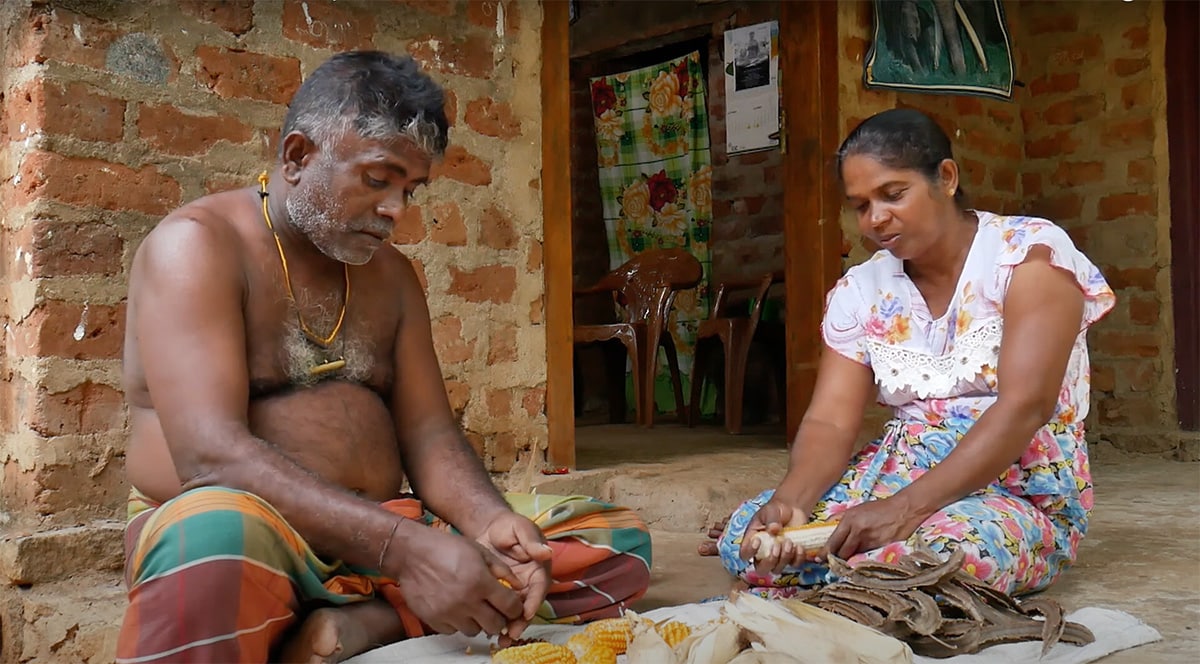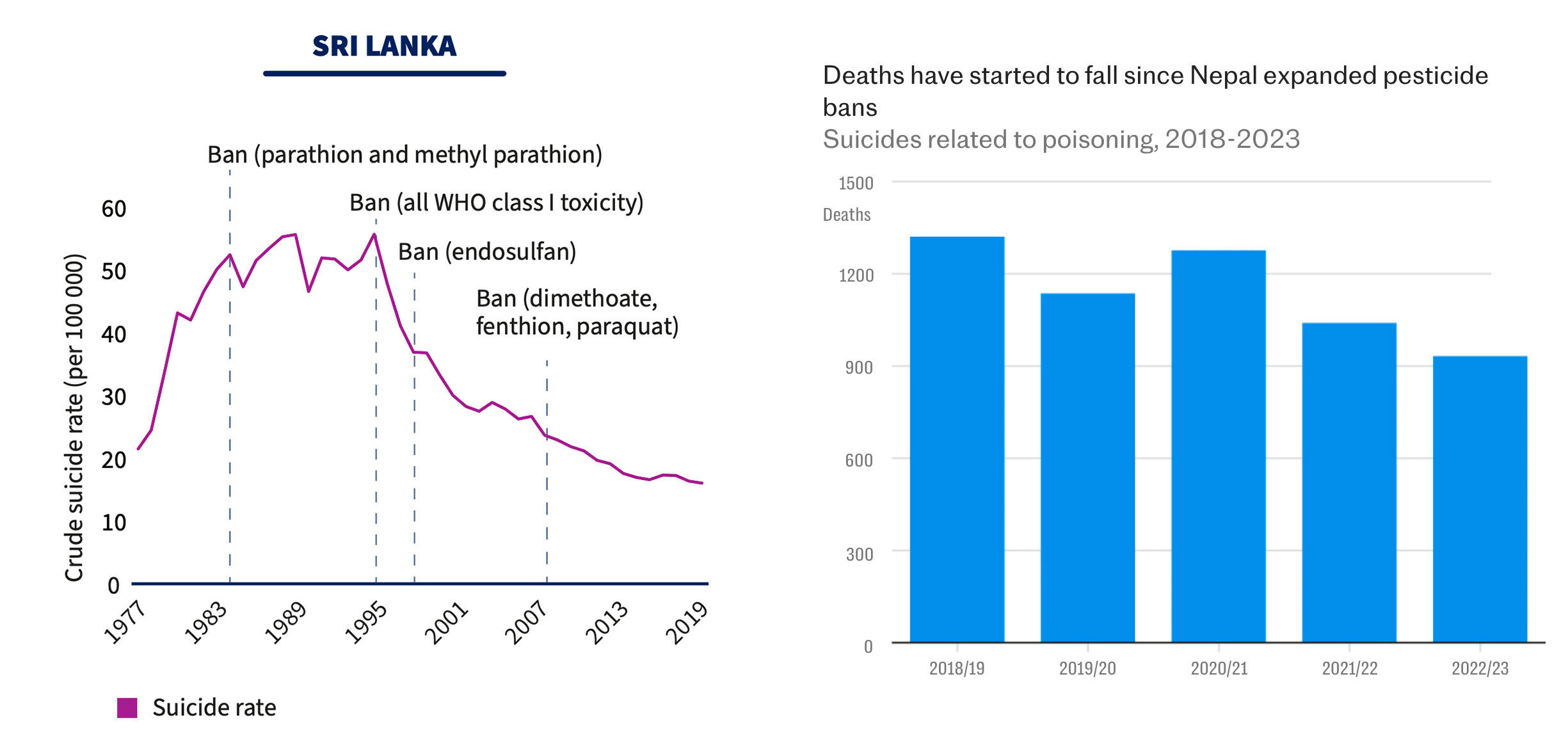Volcanoes are erupting in The Philippines, but on-fire Australia received some welcome rain. The Iran war cries have been called off and The Donald’s military powers are about to be hamstrung by the Senate. Meanwhile, his impeachment trial is starting, and we’re all on Twitter for a front-row seat.
What Could Go Right? Pesticide Bans Are Really Effective
They have prevented hundreds of thousands of suicides worldwide.
This is our weekly newsletter, What Could Go Right? Sign up here to receive it in your inbox every Thursday at 5am ET. You can read past issues here.
Content warning: this edition of the newsletter discusses suicide. If you are having suicidal thoughts, a list of crisis lines by country can be found here.
Pesticide Bans Are Really Effective
Tikiri Banda, a farmer in Sri Lanka, has drunk pesticides twice. Both times were after an argument with his wife, when he was “in a rage,” he said. “I wanted something quick.”
Legislation passed in the South Asian nation since the 1980s meant that the pesticides he took—which many small farmers apply manually to their crops and have within easy reach at home—had low levels of toxicity. Tikiri Banda survived both attempts at self-harm, after family members came running and brought him to the hospital.

Drinking pesticide is one of the most common methods of suicide in low- and middle-income countries, where there is little regulation around their lethality and access—anyone can buy containers of the stuff at a local corner store for just a few cents. The World Health Organization (WHO) estimates that their intentional ingestion causes 140,000 deaths annually.
While the topic is distressing, it is yet another little-discussed issue that the world has made progress on: these deaths are down from an estimated 371,000 in the late 90s.
It is also one case in which the line between enacting legislation and seeing results is almost totally straight, in places with high incidence of suicide through pesticide ingestion. Some countries that have banned the most hazardous pesticides, or mandated that others contain lower levels of toxic chemicals, have seen striking reductions in suicide rates not only from pesticides, but also across the board.
This is because self-harm through pesticides is usually impulsive, done in the heat of the moment, as in Tikiri Banda’s story. Those who survive are able to access psychological services and receive support from their networks and communities, and the attempt is usually not repeated. (Tikiri Banda is an outlier in that respect.) Pesticides are also deadlier than other poisoning agents, like pills, so there is a higher chance of survival if pesticides are not readily available.
Except for Greece, every country that has been studied shows drops in pesticide suicides following bans. After a series of them beginning in 1983, Sri Lanka’s national suicide rate dropped a stunning 70 percent by 2015, saving an estimated 93,000 lives. South Korea and Bangladesh, too, have registered large declines in overall rates, without any negative effect to agricultural output.
More recently, in 2019, Nepal banned the sale and import of eight pesticides, adding two more to the ban list in July of this year. Deaths from poison-related suicides have since dropped 30 percent.

An article in The Telegraph details how fast the process moved in Nepal, after a 2018 study “tracked which of the ‘plant medicines’ (as locals call them) were most often used in poisoning deaths.” Legislation was passed one year later, a rare, quick timeline given the pesticide industry’s immense interest in keeping the chemicals readily available to the public.
Indeed, experts have criticized the pesticide industry’s infiltration of research and international bodies to slow-roll bans worldwide or move focus to providing at-home safe storage for pesticides. Safe storage is not the “satisfy everyone” solution that it might seem: the only large-scale study examining its efficacy not funded by the pesticide industry showed that it didn’t work to prevent suicides. In 2016, the WHO was still considering safe storage as an option; by this year, the international health body had moved to advocating for phasing out highly dangerous pesticides.
If that could be done globally, it would be something going right.
What Could Go Right? S6 E23

How do we know which information on social media is real? How can we overcome campaigns of disinformation and misinformation? Zachary and Emma speak with Jiore Craig, global and political media strategist. They discuss the formats that disinformation campaigns use, how they target age groups differently, and various ways for users to combat these campaigns. | Listen now
By the Numbers
7: The number of states that have passed state-wide policies that ban or restrict cell phone use in schools. Fourteen other states have introduced legislation to do the same.
4-5%: The decrease in the US’ violent crime rate between June 2023 and 2024, according to figures from the Federal Bureau of Investigation. This year’s violent crime rate is shaping up to be the lowest reported since 1969.
$30B: The amount of money already pledged for a massive electrification project that would bring electricity to half of the 600 million people in Africa currently without it. (Bloomberg $)
443: The number of maternal deaths per 100,000 births in Sierra Leone, down from 1,120 per 100,000 in 2017, when the West African nation had the third highest maternal mortality rate in the world. (This is dramatic progress but far from the global target for 2030, which is 70 per 100,000.)
Quick Hits
🧬 In a world first, a woman with type 1 diabetes is now producing her own insulin after receiving a transplant of reprogrammed stem cells that had been taken from her own body. “I enjoy eating everything,” the woman told Nature, now that she can eat foods with sugar.
🫶 After a decline in empathy in young people between 1979 and 2009, a new study has shown that American college students and high school seniors are now “engaging in perspective-taking and empathic concern at higher rates,” reports CNN.
💊 The Food and Drug Administration has approved the first new drug for schizophrenia in more than 30 years. Rather than adjust the brain’s dopamine levels, Cobenfy works by adjusting another brain chemical, acetylcholine. In clinical trials, the drug helped manage hallucinations, delusions, and disorganized thinking.
📉 Global extreme poverty has returned to pre-pandemic levels, after a surge due to the Covid-19 pandemic. The World Bank expects that the number of extreme poor will decrease to about 692 million in 2024, down from around 713 million in 2022. (Related food for thought: the founder of Our World in Data, Max Roser, argues in The New York Times that we should set a new, more ambitious poverty line ($) of living on less than $30 per day.)
🏳️🌈 Thailand has officially become the first nation in Southeast Asia to legalize gay marriage, after the nation’s king signed a marriage equality bill into law last week. The law will come into effect in January 2025.
🏭 The United Kingdom has shut down its last coal-powered plant. For the occasion, MIT Technology Review looks at the fast progress in phasing out coal that many wealthy economies have seen, as well as where in the world coal is still king. Carbon Brief does a deep dive into how the UK stopped using coal power here.
🌳 Contrary to previous research, a new investigation shows that Africa’s baobab tree, a cultural icon, is thriving and likely climate-resilient. (NYT $)
☄️ What if the Earth is in the path of an asteroid? We could knock the asteroid off course. Or, as scientists have recently shown, we could detonate a nuclear bomb near it . . .
🚄 A couple of city-based climate solutions: New York City has begun to install porous material ($) on its streets. It looks like asphalt, but allows rainfall to be absorbed by the earth, rather than fill the city’s sewers. In Barcelona, the city is powering its subway system—and nearby electric vehicle chargers—in part by converting the friction created by a train’s brakes into electricity. “Regenerative braking” is expected to provide 41 percent of the energy needed to power Barcelona’s subway trains.
🔬 Various forms of birth control for men are in development, including a pill that inhibits a receptor for vitamin A in the testes, gels, and an on-demand option that a man could take before sex.
👀 What we’re watching: The inventor of the single-use auto-disable syringe, which reduced the spread of HIV and other diseases in the decades following its creation in 1987, is working on a self-injected syringe that can be easily produced and come preloaded with any medication.
💡 Editor’s pick: Heatmap News has published a comprehensive guide to how to decarbonize your life, from how to make your home energy efficient to making eating responsibly more fun.
TPN Member Originals
(Who are our Members? Get to know them.)
- The candidates who need your money the most | Slow Boring | Matthew Yglesias
- The myth of degrowth | The Free Press | James Pethokoukis
- Hezbollah’s downfall exposes Iran’s weakness | GZERO | Ian Bremmer
- What this Israel-Hezbollah-Hamas-Iran conflict is really about | NYT ($) | Thomas L. Friedman
- Biden and Blinken, Israel’s lawyers | Nonzero | Robert Wright
- How to stop self-obsessing and be happier | The Atlantic ($) | Arthur C. Brooks
- Dictator dreams | The Edgy Optimist | Zachary Karabell
- Why US drug overdose deaths are dropping in the East, but not the West | NYT ($) | Maia Szalavitz
 Why are more men dying from unnatural causes? | The Prof G Show | Richard V. Reeves & Scott Galloway
Why are more men dying from unnatural causes? | The Prof G Show | Richard V. Reeves & Scott Galloway- Unserious people | No Mercy/No Malice | Scott Galloway
- The life well-lived, part 1 | The Roots of Progress | Jason Crawford
- Expanding democracy is the best way to safeguard it | WaPo ($) | Theodore R. Johnson
- Jimmy Carter‘s first century | Breaking the News | James Fallows
 Metascience 101 | Macroscience | Caleb Watney
Metascience 101 | Macroscience | Caleb Watney


